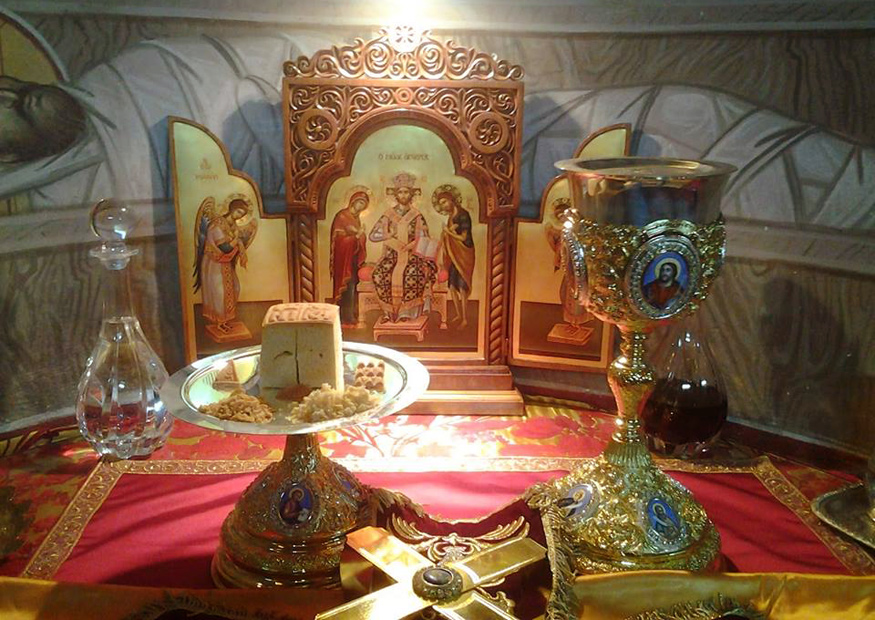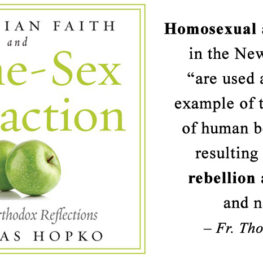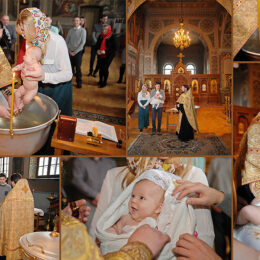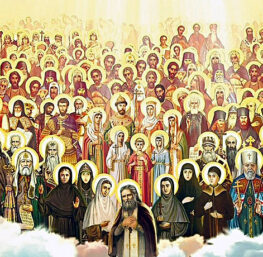 by Fr. Thomas Hopko –
by Fr. Thomas Hopko –
The sacraments in the Orthodox Church are officially called the “holy mysteries.” Usually seven sacraments are counted: baptism, chrismation (or confirmation), holy eucharist, penance, matrimony, holy orders and the unction of the sick.
The practice of counting the sacraments was adopted in the Orthodox Church from the Roman Catholics. It is not an ancient practice of the Church and, in many ways, it tends to be misleading since it appears that there are just seven specific rites which are “sacraments” and that all other aspects of the life of the Church are essentially different from these particular actions. The more ancient and traditional practice of the Orthodox Church is to consider everything which is in and of the Church as sacramental or mystical.
The Church may be defined as the new life in Christ. It is man’s life lived by the Holy Spirit in union with God. All aspects of the new life of the Church participate in the mystery of salvation. In Christ and the Holy Spirit everything which is sinful and dead becomes holy and alive by the power of God the Father. And so in Christ and the Holy Spirit everything in the Church becomes a sacrament, an element of the mystery of the Kingdom of God as it is already being experienced in the life of this world.
The Church may be defined as the new life in Christ.
Viewing the Church as the new and eternal life of the Kingdom of God given to man by God through Jesus Christ in the Holy Spirit, we understand first of all that for life to exist there must be birth. The birth into the eternal life of God is the mystery of baptism. But birth is not enough for living; there must be the ongoing possibility of life: its power, energy and force. Thus, the mystery of chrismation is the gift of the power to live the life of Christ which is born in man by baptism. It is the gift of the “all-holy and good and life-creating Spirit” to man.
Life also must be sustained. This is normally done by eating and drinking. Food is the nourishment which keeps us alive. It is man’s communion with creation which keeps him existing. But, naturally speaking, our normal eating and drinking does not keep us alive forever. Our natural communion with the world is a communion to death. W e need eating and drinking of a special food which nourishes us for eternal life. This food is the “mystical supper of the Son of God,” the body and blood of Christ, the mystery of the holy eucharist — the communion to Life Itself.
Life also must be sustained.
For life to be truly perfect, holy and good, there must also be a particular mystery about marriage and the bearing of children. In this world all who are born are born to die, and even the most perfect of human love stands under the condemnation: “… until death do you part.” The mystery of Christian marriage transforms human love, childbearing, and family communities into realities of eternal proportion and significance. In marriage we are blessed by God for unending friendship and love. We are blessed so that the fruit of our love, the begetting of our children and the life of our families will be not “unto death” but unto life everlasting.
Until the final establishment of the Kingdom of God, our life remains under the attack of its demonic enemies: sin, sickness, suffering, sorrow and death. The mystery of penance is the remedy for spiritual sickness. It allows us to turn again to God, to be taken back, to be forgiven and to be received once more into the life of God from which our sins have separated us. And the mystery of holy unction is the remedy for our physical sickness which is the power of sin over our bodies, our inevitable union with suffering and death. Holy unction allows us to be healed; to suffer, not “unto death” but, once more, unto life everlasting. It is the incorporation of our wounds into the life-creating cross of Christ.
I came that they may have life, and have it abundantly.
The mystery, finally, which allows the perfection of divine life to be ours in all of its fullness and power in this world is the mystery of the Church itself. And most specifically within the Church, we have the mystery of holy orders: the sacrament of priesthood, ministry, teaching and pastoral care. The clergy of the church — bishops, priests, and deacons — exist for no other purpose than to make manifest, present and powerful in the Church the divine life of the Kingdom of God to all men while still living in this world. Thus, from birth to death, in good times and bad, in every aspect of worldly existence, real life — life as God has created and saved and sanctified it to be — is given to us in the Church. This is Christ’s express purpose and wish, the very object of his coming to the world: “I came that they may have life, and have it abundantly” (John 10:10).
The Church as the gift of life eternal is by its very nature, in its fullness and entirety, a mystical and sacramental reality. It is the life of the Kingdom of God given already to those who believe. And thus, within the Church, everything we do — our prayers, blessings, good works, thoughts, actions — everything participates in the life which has no end. In this sense everything which is in the Church and of the Church is a sacrament of the Kingdom of God.




